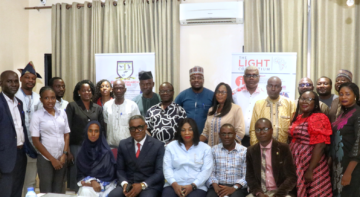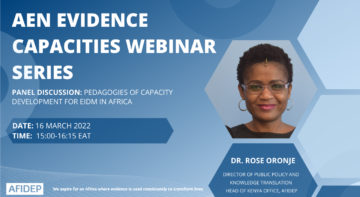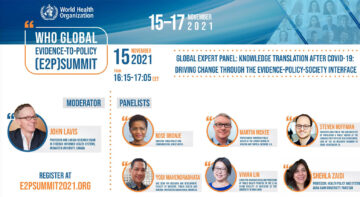News

Last June, AFIDEP joined a meeting in London convened by the Wellcome Trust for its grantees to brainstorm on the Trust’s new policy engagement programme. Although the Trust is a major funder of health research, it has not put much focus or investments in policy engagement efforts to facilitate research uptake by policymakers. However, growing interest and focus on evidence-informed decision-making (EIDM) has attracted the Trust’s attention to policy engagement. At the London meeting, the Trust’s grantees recommended the formation of a platform or network to facilitate sustained sharing of lessons and inform the thinking around the Trust’s policy engagement programme.
Fast-forward, last week on February 26-27, 2019, the Trust’s only research center in a low-income country, the Malawi-Liverpool-Wellcome Trust Clinical Research Centre (MLW), and AFIDEP hosted a follow-up workshop in Lilongwe to take stock of how the Trust’s grantees are progressing in their policy engagement efforts, as well as, share and discuss experiences to inform the thinking on the Trust’s policy engagement programme. The workshop was funded by the Trust.
Why is this important to us at AFIDEP?
Our primary mandate at AFIDEP is to promote and contribute to institutionalising a culture of EIDM in development efforts in Africa. To do this, we, among others, contribute to growing and expanding the EIDM field on the continent. Dr. Eliya Zulu, AFIDEP’s Executive Director, who was involved in both the London and Lilongwe meetings, says “our involvement in all these greatly further our mandate because it enables us to contribute to the thinking of the Wellcome Trust, which is a leading funder of health research, on policy engagement.” He adds, “part of our role in growing the EIDM field is to interest more funders and bring them on board in efforts to intensify EIDM activities across the continent.”
Engaging in these forums has enabled us to inform the policy engagement efforts of the Trust’s grantees through sharing our experiences and lessons from our longstanding work in EIDM in Africa. Through these engagements, we also expand the EIDM community of practice on the continent.
Networks can play an even bigger role in facilitating evidence use
We themed the Lilongwe workshop on the role of networks in promoting and enabling evidence uptake in policy and programme decisions. This is because evidence has repeatedly confirmed the critical role of networks and relationships in enabling EIDM. At the workshop, various networks were represented, including the International Network of Government Science Advisors (INGSA), the African Academy of Sciences (AAS), and the emerging Evidence Informed Decision-making Network for Health Policy and Practice in Malawi (EVIDENT). Networks play a big role in stimulating interest and facilitating uptake of evidence by decisionmakers. However, these networks face various challenges, including that they are poorly structured, unstable, and most importantly, face grave sustainability challenges.
We believe that if governments and development actors value the current contribution of networks in enabling EIDM, they need to translate this into investments needed to strengthen and institutionalise these networks so that they can run more effectively.
According to Dr. Zulu, discussions at the workshop made it clear that Ministries of Health (MoHs) in resource-poor countries face a daunting challenge of having to deal with numerous uncoordinated and fragmented actors, all seeking to improve health. Says he, “this applies even to actors like us who are trying to influence MoH’s policy and programme decisions with evidence.” He adds, “a platform or network at country level coordinated by the MoH could play a big role in coordinating actors’ efforts to inform policy and programmes.”
The Evidence-Informed Policy Network (EVIPNet) operated by the WHO implemented similar efforts in various countries in Africa and around the world. In fact, the Malawi MoH’s Knowledge Translation Platform (KTP) established in 2012 drew from the experiences of EVIPNet in Africa. Although this platform has made some progress, its efforts have been greatly hampered by inadequate funding.
Renewed efforts through the EVIDENT network, spearheaded by the Malawi MoH (under the KTP), MLW, the College of Medicine (CoM, at the University of Malawi), and AFIDEP, provide an opportunity for health sector actors in Malawi to collectively inform policy and programme decisions for improved health outcomes in the country. Through EVIDENT, the MoH, MLW, CoM, and AFIDEP have formed a “Policy Unit” currently housed at CoM to coordinate the translation and discussion of evidence on specific health priority issues for MoH and the country, at large. This Unit is coordinated by the MoH, and once it is well established and grounded, it will need to move to operate from the MoH’s Public Health Institute in order to be fully accessible to all evidence actors in the country’s health sector.
Growing hope for the EIDM field
Despite being critical in improving the outcomes of development efforts and ultimately improving lives, the EIDM field is still nascent, particularly in regard to funding and programming. The increasing interest in policy engagement at the Wellcome Trust is good news and provides hope for the field, given the Trust’s big role in funding health sciences research. At AFIDEP, we continue to be hopeful that more governments on the continent and development actors will translate their interest in EIDM into long-term investments needed in order to institutionalise a culture of evidence use.
Related Posts





